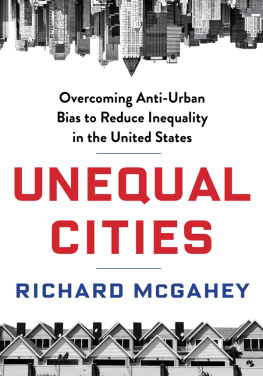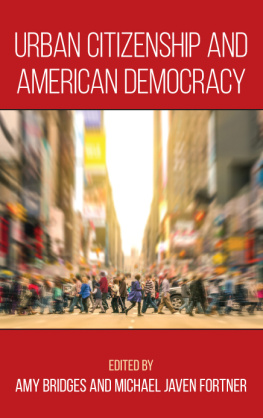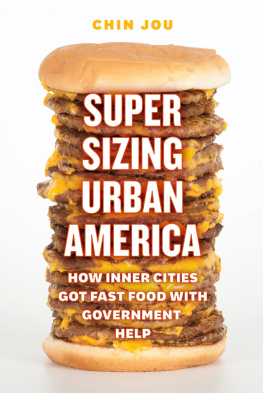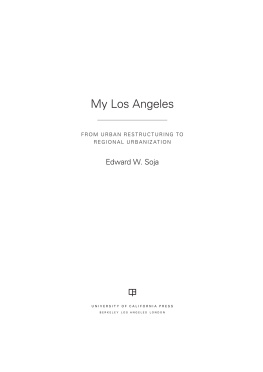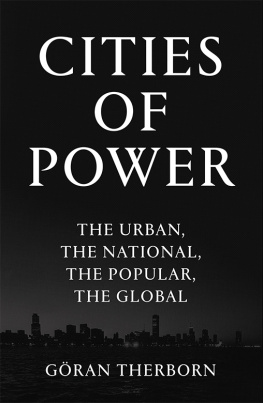Contents
Guide
Page List
AMERICANS AGAINST THE CITY
AMERICANS AGAINST THE CITY
Anti-Urbanism in the Twentieth Century
Steven Conn


Oxford University Press is a department of the University of
Oxford. It furthers the Universitys objective of excellence in research,
scholarship, and education by publishing worldwide.
Oxford New York
Auckland Cape Town Dar es Salaam Hong Kong Karachi
Kuala Lumpur Madrid Melbourne Mexico City Nairobi
New Delhi Shanghai Taipei Toronto
With offices in
Argentina Austria Brazil Chile Czech Republic France Greece
Guatemala Hungary Italy Japan Poland Portugal Singapore
South Korea Switzerland Thailand Turkey Ukraine Vietnam
Oxford is a registered trademark of Oxford University Press
in the UK and certain other countries.
Published in the United States of America by
Oxford University Press
198 Madison Avenue, New York, NY 10016
Oxford University Press 2014
All rights reserved. No part of this publication may be reproduced, stored in a retrieval system, or transmitted, in any form or by any means, without the prior permission in writing of Oxford University Press, or as expressly permitted by law, by license, or under terms agreed with the appropriate reproduction rights organization. Inquiries concerning reproduction outside the scope of the above should be sent to the Rights Department, Oxford University Press, at the address above.
You must not circulate this work in any other form and you must impose this same condition on any acquirer.
Library of Congress Cataloging-in-Publication Data
Conn, Steven.
Americans against the city : anti-urbanism in the twentieth century / Steven Conn.
pages cm
Includes bibliographical references and index.
ISBN 9780199973668 (hardback)
1. Urban renewalUnited StatesHistory. 2. UrbanizationUnited StatesHistory.
3. Decentralization in governmentUnited StatesHistory. 4. Urbanization
5. Decentralization in governmentUnited States. I. Title. HT175.C637 2014
307.34160973dc23
2013044642
9 8 7 6 5 4 3 2 1
Printed in the United States of America
on acid-free paper
For Angela, and for Olivia and Zachary, toobecause of all the cities we have explored together
CONTENTS
As Crosby, Stills, and Nash once sang: Its been a long time comin
This book began on an evening walk with my parents, Terry and Peter, nearly a decade ago; and while I have called in many favors, accumulated many debts, and even relied on the kindness of strangers, my first expression of gratitude belongs to them. They remain models for me in so many different ways.
Lots of things have gotten in the way of finishing this bookmany that were rewarding, some that were onerous, much that was necessary. But none have been as gratifying as my two children Zach and Olivia, who transformed from toddlers into teens as I wrote this, becoming more and more interesting, complicated and fun along the way. I owe my second thanks to them.
It gives me great pleasure to look back at all the help I have received from friends and colleagues as I worked my way through this project. I have called upon Kevin Boyle, Saul Cornell, Jacob Dorn, Robert Fishman, Alison Isenberg, Michael Kammen, Chris Klemek, Bruce Kuklick, Max Page, Nathaniel Popkin, Wendell Pritchett, Bryant Simon, Tom Sugrue, and Mike Zuckerman for advice, help, and encouragement. I need to thank Dan Amsterdam, Bill Childs, Bob Fogarty, and Dave Steigerwald in particular for their generosity with me. My students Delano Lopez and Patrick Potyondy asked some very hard questions about the book and made it better in so doing. Nancy Toff, my editor at Oxford University Press, came along at just the right moment to give me a final push. And I would not have finished this project were it not for the help from two very able graduate students, Leticia Wiggins and Renya Esquivel-King.
I benefited from a number of archival collections and the staff at each, including the Van Pelt Library at the University of Pennsylvania, the Rockefeller Archive Center, the special collections at the University of Illinois, Chicago, the Houston Metropolitan Research Center at the Houston Public Library, the Greenhills Historical Society, and the special collections at Wright State University.
Long as it has taken, this book would still not be finished were it not for a grant I received from the American Philosophical Society to support a year of research and writing. I did much of that work in the Olive Kettering Library at Antioch College. The resources of that terrific facility are matched by the generosity of the staff, who have given me so much help. Jim and Sandy and Ritch and Duffy have all amiably put up with me, but Scott Sanders deserves a special mention. I have come to rely on his remarkable breadth of knowledge and his dependable good humor.
My wife, Angela Brintlinger, was along for that walk with my parents on that chilly fall evening. If a partnership is a metaphorical journey, then ours can be measured in the walks she and I have taken together over the years. Hundreds of them. Miles and miles of them. Ive treasured every step.
AMERICANS AGAINST THE CITY
INTRODUCTION
THE AMERICAN URBAN PARADOX
DATELINE: Roanoke County. Roanoke County, Virginia, sits in the southwestern part of the commonwealth, just as the state begins to taper to a point. It is, without question, a pretty part of the country. Just south of the Shenandoah Valley, just east of the Appalachians, its hills and valleys, farm fields and forests, range from picturesque to gorgeous. No mystery that tourism is an increasingly important part of the local economy.
At first glance, Roanoke County is part of rural America. As of 2010, there were just 100,000 residents spread over the countys 251 square miles. And like much of rural America, Roanoke County is a politically conservative place. Over the last half-century it has voted reliably and overwhelmingly for the Republican presidential candidate. Barry Goldwater won less than 40 percent of the vote nationally in 1964, but he captured 55 percent of the vote here. Virtually all of those 100,000 residents are white.
That first glance, however, belies the real picture. Roanoke County does not count the nearly 100,000 people who live in the city of Roanoke, which sits as an independent municipal entity in the middle of the county. Further, much of the countys population is clustered around the city. Taken together, Roanokers are not rural Americans, really. They are urban and suburban Americans.
In other words, Roanoke County constitutes a much larger metropolitan region, with a population of roughly 200,000in fact, the fourth largest county in Virginia, and by far the largest in southwestern Virginia. As with many metropolitan areas, the city serves as the center of the region, economically and culturally. And in the summer of 2011, Roanoke County became a small front in a national battle.
After the election of 2008, when Roanokers gave 60 percent of their vote to John McCain, Roanoke County became Tea Party country. The media have certainly reported about the Tea Party anger directed at Washington and the big-spending liberals who reside there. Equally important, though perhaps less discussed, have been the attacks by activists against the actions of local governments. In Roanoke County, that means anger was directed at the five-member board of supervisors.
The board had begun to explore a number of initiatives under the broad umbrella of sustainability: ideas that ranged from bike paths and smart electric meters to encouraging development around public transportation nodes. Tea Partiers in Roanoke County saw these initiatives as a naked attempt to make the county more urban, and they smelled government conspiracy.



